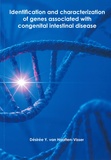Identification and characterization of genes associated with congenital intestinal disease

Haaften - Visser, Désirée van
- Promoter:
- prof.dr. R.H.J. (Roderick) Houwen & prof.dr. P.J. (Paul) Coffer
- Research group:
- Coffer
- Date:
- November 28, 2017
- Time:
- 14:30 h
Summary
Congenital diseases of the gastrointestinal tract are associated with significant morbidity and mortality. Treatment of these diseases can be challenging due to the lack of curative therapies. To be able to improve treatment options knowledge of the pathophysiology of diseases is essential. This thesis focuses on the identification of novel gene defects associated with infantile-onset inflammatory bowel disease, microvillus inclusion disease and severe congenital fat intolerance.
Infantile-onset inflammatory bowel disease (IO IBD) is a severe, chronic inflammation of the intestine with an onset before the age of two years. In the pathogenesis of this disease genetic defects are extremely important. In this thesis the discovery of an association between mutations in ANKZF1 and IO IBD has been described. ANKZF1 was found to be an essential protein in the mitochondrial response to cellular stress. Depletion of ANKZF1 reduced both mitochondrial integrity and mitochondrial respiration under conditions of cellular stress. The ANKZF1 mutations identified in two patients with IO IBD resulted in dysfunctional ANKZF1.
Microvillus inclusion disease (MVID) is a severe enteropathy, characterized by life-threatening diarrhea with an onset in the first days or months of life, which leads to intestinal failure. MVID is caused by gene defects disrupting the polarity of the enterocyte. Most patients carry mutations in MYO5B, which encodes the motor protein myosin 5b, that is responsible for trafficking of transport vesicles to the apical plasma membrane. This thesis shows that MVID can also be caused by STX3 mutations, which encodes syntaxin 3, a protein located in the apical plasma membrane that is responsible for fusion of vesicles with the apical plasma membrane. The STX3 mutations of two MVID patients resulted in a deficiency of syntaxin 3 leading to a disturbed polarity of the enterocytes.
Several gene defects are known that cause fat intolerance. This thesis describes the association of a novel gene, DGAT1, with fat intolerance. DGAT1 catalyzes the conversion of diacylglycerol to triacylglycerol in the enterocyte, a reaction essential for intestinal triacylglycerol absorption. DGAT1 mutations identified in two brothers with severe congenital fat intolerance cause ubiquitin-mediated proteasomal degradation of DGAT1 resulting in a deficiency of this protein.
The discoveries of an association between mutations in ANKZF1, STX3 and DGAT1 and infantile-onset inflammatory bowel disease, microvillus inclusion disease and severe congenital fat intolerance respectively were mediated by whole-exome sequencing (WES). WES is not only used in the identification of novel disease-associated genes, but can also be used in the diagnostics of genetically heterogeneous diseases. This thesis describes the implementation of WES in the diagnostics of congenital diarrhea. It also introduces a two-step analysis, where first all genes known to be associated with congenital diarrhea are analysed. When no underlying mutation is identified, analysis is extended to the whole exome.
The identification of gene defects underlying a disorder as described in this thesis is important, since it enables genetic counselling and may clarify prognosis. However, maybe even more important, understanding the pathogenesis of a disease is also the basis of the development of novel therapeutic approaches.